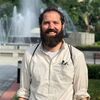Aline Piva, a researcher, and journalist based in Sao Paulo joined Misfit hosts Bob Schlehuber and Jamarl Thomas to explain the crisis brewing in Jair Bolsonaro’s government. She puts the current standoff between Bolsonaro and Sergio Moro in context, explains Bolsonaro’s undemocratic rise to power, and how, despite pressure, he retains some key support, including that of the military, which has gained enormous power under his administration. She also breaks down the increase in violence against political opposition groups, the power the upper classes have to enforce their own rules against the less powerful, and the new approaches the left is taking in political and class struggles.
Ajamu Baraka, national organizer of Black Alliance for Peace and former Green Party nominee for vice president of the US in 2016, spoke about ways to push back against the looming death march back to work the Trump administration is gearing up for. There’s no formula for this, he said, but that only means it’s a time to experiment, quickly and with energy, to see what does work to unify the opposition in the US. The good news is that people have learned a lot since the days of Occupy Wall Street, and are much more willing to look at political alternatives, including casting a critical eye on the entire corporate and labor structure of society. He makes the case for uniting anti-war voices with anti-imperialist movements and argues that we’ll need international solidarity to truly challenge and upend global corporate capture of governments.
Brandi Thompson Summers, assistant professor of geography at UC Berkeley, and author of “Black in Place: The Spatial Aesthetics of Race in a Post-Chocolate City,” explained how the commodification of ideas of blackness and coolness helps enact the violence of displacement and gentrification, and how ignoring the realities of black experiences and needs allows blackness to become a signifier rather than a powerful political reality.
The hosts also discuss American policing, why police are so often the only members of our society to engage with people who are traumatized and on edge, and how those engagements so often end in death.
We'd love to get your feedback at radio@sputniknews.com




